|
Books Should Be Free Loyal Books Free Public Domain Audiobooks & eBook Downloads |
|
|
Books Should Be Free Loyal Books Free Public Domain Audiobooks & eBook Downloads |
|
Top Authors |
|---|
|
Book type:
Sort by:
|
By: Padraic Colum (1881-1972) | |
|---|---|
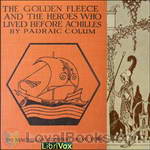 The Golden Fleece and the Heroes Who Lived Before Achilles
The Golden Fleece and the Heroes Who Lived Before Achilles
This is Irish folklorist Padraic Colum's masterful retelling of many Greek myths, focusing on Jason and the Argonauts' quest to find the Golden Fleece. He also includes the stories of Atalanta, Heracles, Perseus, Theseus, and others. | |
 The King of Ireland's Son
The King of Ireland's Son
The King of Ireland's Son is a children's novel published in Ireland in 1916 written by Padraic Colum, and illustrated by Willy Pogany. It is the story of the eldest of the King of Ireland's sons, and his adventures winning and then finding Fedelma, the Enchanter's Daughter, who after being won is kidnapped from him by the King of the Land of Mist. It is solidly based in Irish folklore, itself being originally a folktale. (Introduction by Wikipedia) | |
By: Anonymous, attributed to Kathleen Luard (c.1872) | |
|---|---|
 Diary of a Nursing Sister on the Western Front 1914-1915
Diary of a Nursing Sister on the Western Front 1914-1915
The title is, I think, self explanatory. The nurse in question went out to France at the beginning of the war and remained there until May 1915 after the second battle of Ypres when she went back to a Base Hospital and the diary ceases. Although written in diary form, it is clearly taken from letters home and gives a vivid if sometimes distressing picture of the state of the casualties occasioned during that period. After a time at the General Hospital in Le Havre she became one of the three or four sisters working on the ambulance trains which fetched the wounded from the Clearing Hospitals close to the front line and took them back to the General Hospitals in Boulogne, Rouen and Le Havre. | |
By: Ben Bova (1932-) | |
|---|---|
 The Dueling Machine
The Dueling Machine
The Dueling Machine is the solution to settling disputes without injury. After you and your opponent select weapons and environments you are injected into an artificial reality where you fight to the virtual death… but no one actually gets hurt. That is, until a warrior from the Kerak Empire figures a way to execute real-world killings from within the machine. Now its inventor Dr. Leoh has to prevent his machine from becoming a tool of conquest. – The Dueling Machine, written with Myron R. Lewis, first appeared in the May, 1963 issue of Analog Science Fact & Fiction. | |
By: Aeschylus (525/524 BC - c. 455/456 BC) | |
|---|---|
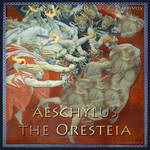 The Oresteia
The Oresteia
The Oresteia is a trilogy by Aeschylus, one of the foremost playwrights of ancient Greece. It encompasses three plays: Agamemnon, The Libation Bearers, and The Furies. It tells the tragic tale of the House of Atreus, whose inhabitants have been cursed and are doomed to play out their bloody, vengeful destinies. At the beginning of the first part, the Trojan War has ended and the Greek general, Agamemnon, is returning victorious to his wife Clytemnestra. Yet she finds it difficult to forgive his sacrifice of their daughter, Iphigenia, who was killed to ensure the Greek fleet fair winds in their voyage to Troy... | |
By: E. E. “Doc” Smith (1890-1965) | |
|---|---|
 Triplanetary, First in the Lensman Series
Triplanetary, First in the Lensman Series
Triplanetary was first serialized in Amazing Stories in 1934. After the Lensman series became popular, Smith took his Triplanetary story and turned it into the first of the Lensman series, using it as a prequel to give the back story for the protaganists in the Lensmen series. He added 6 new chapters, doubling it in size and it's really a different book from the serialized novel, being published 14 years after the first. It was put into Gutenberg just last year. The novel covers several episodes in an eons-long eugenics project of the super-intelligences of the Arisia... | |
By: E. E. Smith (1890-1965) | |
|---|---|
 Subspace Survivors
Subspace Survivors
A team of space travelers are caught in a subspace accident which, up to now, no one has ever survived. But some of the survivors of the Procyon are not ordinary travelers. Their psi abilities allow them to see things before they happen. But will it be enough?Smith's story "Subspace Survivors" first appeared in the July 1960 issue of the magazine Astounding. | |
 Galaxy Primes
Galaxy Primes
They were four of the greatest minds in the Universe: Two men, two women, lost in an experimental spaceship billions of parsecs from home. And as they mentally charted the Cosmos to find their way back to earth, their own loves and hates were as startling as the worlds they encountered. | |
By: Marshall Saunders (1861-1947) | |
|---|---|
 Beautiful Joe
Beautiful Joe
Beautiful Joe is a real dog, and “Beautiful Joe” is his real name. He belonged during the first part of his life to a cruel master, who mutilated him in the manner described in the story. He was rescued from him, and is now living in a happy home with pleasant surroundings, and enjoys a wide local celebrity.The character of Laura is drawn from life, and to the smallest detail is truthfully depicted. The Morris family has its counterparts in real life, and nearly all of the incidents of the story are founded on fact. | |
By: George Meredith (1828-1909) | |
|---|---|
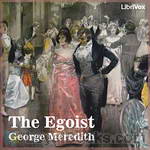 The Egoist
The Egoist
The Egoist is a tragicomical novel by George Meredith published in 1879. The novel recounts the story of self-absorbed Sir Willoughby Patterne and his attempts at marriage; jilted by his first bride-to-be, he vacillates between the sentimental Laetitia Dale and the strong-willed Clara Middleton. More importantly, the novel follows Clara’s attempts to escape from her engagement to Sir Willoughby, who desires women to serve as a mirror for him and consequently cannot understand why she would not want to marry him... | |
 The Shaving of Shagpat
The Shaving of Shagpat
The novel is a humorous oriental romance and allegory written in the style of the Arabian Nights. Like its model, it includes a number of stories within the story, along with poetic asides.“The variety of scenes and images, the untiring evolution of plot, the kaleidoscopic shifting of harmonious colours, all these seem of the very essence of Arabia, and to coil directly from some bottle of a genie. Ah! what a bottle!” -Edmund Gosse in Gossip in a Library | |
By: Titus Lucretius Carus (94? BC - 49? BC) | |
|---|---|
 On the Nature of Things
On the Nature of Things
Written in the first century b.C., On the Nature of Things (in Latin, "De Rerum Natura") is a poem in six books that aims at explaining the Epicurean philosophy to the Roman audience. Among digressions about the importance of philosophy in men's life and praises of Epicurus, Lucretius created a solid treatise on the atomic theory, the falseness of religion and many kinds of natural phenomena. With no harm to his philosophical scope, the author composed a didactic poem of epic flavor, of which the imagery and style are highly praised. | |
By: Peter B. Kyne (1880-1957) | |
|---|---|
 The Valley of the Giants
The Valley of the Giants
The man was John Cardigan; in that lonely, hostile land he was the first pioneer. This is the tale of Cardigan and Cardigan’s son, for in his chosen land the pioneer leader in the gigantic task of hewing a path for civilization was to know the bliss of woman’s love and of parenthood, and the sorrow that comes of the loss of a perfect mate; he was to know the tremendous joy of accomplishment and worldly success after infinite labour; and in the sunset of life he was to know the dull despair of failure and ruin... | |
 The Go-Getter
The Go-Getter
A disabled veteran succeeds as a civilian with persistence and military focus. | |
By: Thomas Nelson Page | |
|---|---|
 Santa Claus's Partner
Santa Claus's Partner
Livingstone has reached a pinnacle in his life. He is finally worth 7 figures, yet his bottom line requires that he cut back on charities this year at Christmas time. Business is business, after all. But success makes him surly and his accomplishment soon feels anti-climatic. Regrets plague him. Can he rediscover the joy of life with the help of Santa Claus’s Partner? | |
By: Shaykh Hasan | |
|---|---|
 Persian Self-Taught (in Roman Characters) with English Phonetic Pronunciation
Persian Self-Taught (in Roman Characters) with English Phonetic Pronunciation
This volume is primarily intended to supply a working and practical knowledge of the Persian language, for the benefit of those who have not the time or the inclination to master the grammar, and yet require to use the spoken tongue for purposes of business or pleasure. With this object in view it supplies many vocabularies of words carefully selected to suit the needs of those holding communication with Persia and the Persians, classified according to subject, and a large number of colloquial phrases... | |
By: Wadsworth Camp (1879-1936) | |
|---|---|
 The Abandoned Room
The Abandoned Room
An enthralling locked room mystery, The Abandoned Room focuses on the mysterious circumstances under which Silas Blackburn has been murdered at The Cedars, an eerie and isolated country estate. The most obvious suspect to the murder is Bobby Blackburn, the victim’s grandson who seems to have the best motive for the murder, although he has no recollection of the fateful night. Furthermore, Camp integrates a vibrant array of characters, detailed description, supernatural occurrences, and a generous supply of suspense, which in turn build up the novel’s allure... | |
By: Andrew B. Paterson | |
|---|---|
 The Man from Snowy River and other Verses
The Man from Snowy River and other Verses
A collection of poems by Australian poet Andrew Barton ‘Banjo’ Paterson, picturesque glimpses into life in the Bush. From the preface: “A number of these verses are now published for the first time, most of the others were written for and appeared in ‘The Bulletin’ (Sydney, N.S.W.), and are therefore already widely known to readers in Australasia.” | |
By: Edith Nesbit (1858-1924) | |
|---|---|
 Pussy and Doggy Tales
Pussy and Doggy Tales
Charming Tales about cats and dogs. | |
 Story of the Amulet
Story of the Amulet
The third of the series featuring Cyril, Anthea, Robert and Jane: four children who are, as they often say, "the sort of people that wonderful things happen to". In 'Five Children and It' they were lucky enough to meet the magical, wish-granting Psammead - and in this final book they meet him once again. He guides them to an ancient Amulet that will help them find their hearts' desire - but it's only half an amulet, and seeking for the other half has them whizzing about through time on another series of amazing adventures. | |
 Rainbow and the Rose
Rainbow and the Rose
A collection of poetry in the whimsical style of Edith Nesbit, author of "The Five Children and It" and "The Railway Children". These poems are primarily for adults, although a few are written for her daughters. The majority are philosophical reflections on Edith Nesbit's life as a wife and mother, and theological reflections on Christianity and faith, the nature of the world, life and death. | |
By: Somerset Maugham | |
|---|---|
 Of Human Bondage
Of Human Bondage
Of Human Bondage, published in 1915, is considered to be W. Somerset Maugham’s best work. Many believe the novel to be one of the world’s literary masterpieces. The story follows Phillip Carey from early childhood through his 30’s. Orphaned at 9, Phillip spends his early years raised by his childless aunt and uncle. His aunt tries to be a mother to Philip, but she is unsure how to behave whereas his uncle, a vicar, takes a cold disposition towards him. Philip is sent to a boarding school but his shyness and his club foot make it difficult for him to fit in... | |
By: Dorothy Quigley | |
|---|---|
 What Dress Makes of Us
What Dress Makes of Us
A wickedly funny book of advice on women’s dress. However old, fat or plain you are, Dorothy Quigley will tell you what not to wear. | |
By: Alice Hale Burnett | |
|---|---|
 Christmas Holidays at Merryvale
Christmas Holidays at Merryvale
“Toad” Brown, his brother, and their friends have a jolly time at the Christmas holidays. They daydream at a toyshop window, chop down a Christmas tree in the woods, have a grand snowball fight, and plan a surprise for a friend in this tale of early 20th-century small-town life. Published in 1916, this short book is perfect for younger readers and listeners. Read along and see the charming illustrations. | |
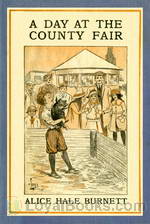 A Day at the County Fair
A Day at the County Fair
Three little friends are taken to the County Fair in Uncle Billy’s motorcar, but a slight delay occurs on the way. How they finally arrived at the fair ground and their amusing experiences are most entertainingly told in this short book for younger readers and listeners. Read along and see the charming illustrations. | |
By: Poul Anderson (1926-2001) | |
|---|---|
 Security
Security
“Security”, tells the story of a compartmentalized government physicist ordered by secret police to complete experiments aimed at developing a new weapon. He is brought to a hidden space station and put in charge of the project but there are many questions. In a world of spies watching spies it’s sometimes hard to know what’s patriotic. -- Poul Anderson was a Golden Age Science Fiction and Fantasy author. “Security” first appeared in the magazine “Space Science Fiction” in February of 1953 | |
By: Edmund Gosse (1849-1928) | |
|---|---|
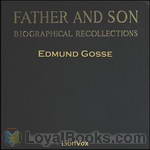 Father and Son
Father and Son
Father and Son (1907) is a memoir by poet and critic Edmund Gosse, which he subtitled “a study of two temperaments.” The book describes Edmund’s early years in an exceptionally devout Plymouth Brethren home. His mother, who dies early and painfully of breast cancer, is a writer of Christian tracts. His father, Philip Henry Gosse, is an influential, though largely self-taught, invertebrate zoologist and student of marine biology who, after his wife’s death, takes Edmund to live in Devon... | |
 Gossip in a Library
Gossip in a Library
A collection of informal essays about books in his library. He combines commentary, translations, and humorous asides about authors and their subjects. | |
By: Charles H. Spurgeon (1834-1892) | |
|---|---|
 All of Grace
All of Grace
HE WHO SPOKE and wrote this message will be greatly disappointed if it does not lead many to the Lord Jesus. It is sent forth in childlike dependence upon the power of God the Holy Ghost, to use it in the conversion of millions, if so He pleases. No doubt many poor men and women will take up this little volume, and the Lord will visit them with grace. To answer this end, the very plainest language has been chosen, and many homely expressions have been used. But if those of wealth and rank should glance at this book, the Holy Ghost can impress them also; since that which can be understood by the unlettered is none the less attractive to the instructed... | |
 The Treasury of David
The Treasury of David
Charles Spurgeon was a British Particular Baptist preacher who remains highly influential among Christians of different denominations, among whom he is still known as the "Prince of Preachers". In his lifetime, Spurgeon preached to around 10,000,000 people, often up to 10 times each week at different places. He was the pastor of the congregation of the New Park Street Chapel (later the Metropolitan Tabernacle) in London for 38 years.Spurgeon was a prolific author of many types of works. This is the first volume of Spurgeon’s commentary on the Psalms, covering Psalms 1 to 26. | |
By: Jane Porter (1776-1850) | |
|---|---|
 The Scottish Chiefs
The Scottish Chiefs
An adventure novel about William Wallace, one of the most popular books ever written by Jane Porter. The French version was even banned by Napoleon, and the book has remained very popular with Scottish children, but is equally enjoyable for adults. | |
By: A. E. Housman (1859-1936) | |
|---|---|
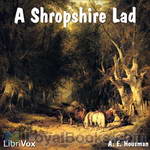 A Shropshire Lad
A Shropshire Lad
This is a lovely collection of melodic poems, many melancholy in tone, many featuring Housman's constant theme of living this short life to the fullest. | |